|
|
|
Sort Order |
|
|
|
Items / Page
|
|
|
|
|
|
|
| Srl | Item |
| 1 |
ID:
179994


|
|
|
|
|
| Summary/Abstract |
Amritsar is famous for its landscape of shrines. Recent urban redevelopments have emphasised a closer connection between the city and Sikhism. The recently inaugurated Heritage Street creates focal points in space that visually highlight this connection. Heritage Street forefronts an inclusive view of Sikhism that eclipses historical and political communal tensions and overwrites acts of offence. The dialogue between shrines and the movements of pilgrims and visitors through redeveloped spaces questions the architectured text of Heritage Street to present a parallel, if not competing, view of what heritage might mean.
|
|
|
|
|
|
|
|
|
|
|
|
|
|
|
|
| 2 |
ID:
179989
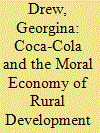

|
|
|
|
|
| Summary/Abstract |
This paper examines the knowledge-practices used by rural activists to raise public concerns about the use of water and land resources by a Coca-Cola bottling plant in Uttar Pradesh, India, between 2004 and 2014. These knowledge-practices included the use of semiotics and carefully crafted discourses—such as slogans and protest songs—to produce knowledge about villagers’ rights to rural subsistence and survival. An aim of this paper is to show the impressive ways in which the social movement persevered by building both public claims to a moral economy as well as village-level practices and institutions that helped to enact visions of what a moral economy could or should be. Of particular significance were activists’ efforts to frame rural water extraction and water rights through a subsistence-focused morality of rural development. This moral economy underscores villager-articulated desires for beneficial forms of economic activity that support rural livelihoods rather than prioritising environmentally destructive corporate activities.
|
|
|
|
|
|
|
|
|
|
|
|
|
|
|
|
| 3 |
ID:
179991
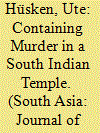

|
|
|
|
|
| Summary/Abstract |
On 3 September 2004, during the Pavitrotsava temple festival which serves to erase all ritual mistakes committed during the previous year, the manager of the Varadarāja Perumāl temple in Kanchipuram was brutally murdered. This murder constituted both a criminal act and a religious offence. In outlining its aftermath, this article analyses the highly dynamic responses to this multifaceted transgression, which depend on and signal the interaction between political power and religious authorities specific to time and place.
|
|
|
|
|
|
|
|
|
|
|
|
|
|
|
|
| 4 |
ID:
179986
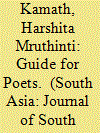

|
|
|
|
|
| Summary/Abstract |
Kavijanāśrayamu, or A Guide for Poets, is the oldest extant text on prosody written in Telugu. For centuries, poets and scholars have debated the authorship, date and geographical location of this text. According to some scholars, the text was authored by Malliya Recana, a Jain scholar of prosody from the tenth century who predates Nannaya, long considered to be the ‘first poet’ (ādikavi) of classical Telugu. In this article, I argue that the contentious epithet of ‘first poet’ ascribed to Recana is intimately tied to the premodern past and the contemporary landscape of the Telugu-speaking states of Telangana and Andhra Pradesh.
|
|
|
|
|
|
|
|
|
|
|
|
|
|
|
|
| 5 |
ID:
179990


|
|
|
|
|
| Summary/Abstract |
In this introduction, we situate the special section, ‘Containing Religious Offence beyond the Courts’, within and beyond existing scholarship on religious offence in South Asia. Much of this scholarship focuses on the unintended effects of blasphemy laws, showing, for instance, that laws presumably intended to promote religious tolerance end up informing, if not encouraging, disputes around religious sensitivities. But while debates about the effects of law are crucial, we suggest that a more nuanced understanding of religious offence can be gained if we look past full-blown legal proceedings and the spectacular violence performed in the streets during religious offence controversies. This collection, then, directs attention to the friction around religious sensitivities that are handled and often mitigated locally—either entirely outside the courts or through bottom-up initiatives that unfold in combination with, or as a reaction to, top-down measures. Drawing on the extensive empirical field research of six scholars of religion and politics, these essays document existing containment modalities in diverse geographical and socio-religious settings in India and critically scrutinise their functioning and outcomes. They explicitly engage with critical understandings of peace and with scholarship on the micro-mechanism of coexistence and, in so doing, open up new avenues of enquiry about religious offence.
|
|
|
|
|
|
|
|
|
|
|
|
|
|
|
|
| 6 |
ID:
179993
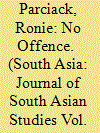

|
|
|
|
|
| Summary/Abstract |
This essay addresses canonisation accounts of the medieval Muslim saint Hazrat Sharafuddin Hyderabadi. According to a contemporary text, a Hindu deity was believed to have been jettisoned from the saint’s dargah, causing communal unrest in the Deccan. How can a Muslim saint be enshrined through offence in a Hindu environment, and how does this create a discourse of both rifts and bridges between Hinduism and Islam in contemporary India? The analysis traces the interdependence between the Muslim and Hindu communities and suggests a more nuanced reading than positions advanced in the current political climate and in recent legislation, which consider them to be irreconcilable socio-religious systems.
|
|
|
|
|
|
|
|
|
|
|
|
|
|
|
|
| 7 |
ID:
179987
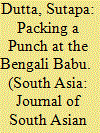

|
|
|
|
|
| Summary/Abstract |
The emergence of the bhadralok in the nineteenth century, typified by ‘genteel’ qualities and Western education, reflected changes in the nature of Bengali identity and subjectivity. The colonial experience resulted in an anxiety among elite Bengalis to define a social class for themselves that would delineate their gentility and shape a new code of ‘acceptability’. The ‘Babu’ came to be associated with this new class of Bengalis eager to adopt Western manners and learning who formed the greater part of the white-collar workers required in the cosmopolitan enclave of Calcutta. They were satirised, particularly in colonial discourse, for their imitation of English manners, attire and language. This article explores the shifting markers of gentility and the satiric representation of the Bengali Babu (and his Bibi) in the British satirical magazine, Punch, and its contemporary vernacular counterparts in colonial Bengal.
|
|
|
|
|
|
|
|
|
|
|
|
|
|
|
|
| 8 |
ID:
179996


|
|
|
|
|
| Summary/Abstract |
In the 1980s and 1990s, during the Ram Janmabhoomi movement, the Gyanvapi mosque in Banaras was identified by Hindu nationalists as the next place to be ‘liberated’ from Muslim presence. A security plan was then implemented by the government to prevent the occurrence of a ‘religious offence’ as specified in the Indian Penal Code, namely ‘destroying, damaging or defiling a place of worship’ (Section 295). Drawing on ethnographic research, this article explores religious offence within and beyond its legal definition and examines the contradictory impact that its containment through policing has on everyday life and interreligious relationships in the centre of Banaras.
|
|
|
|
|
|
|
|
|
|
|
|
|
|
|
|
| 9 |
ID:
179992


|
|
|
|
|
| Summary/Abstract |
This article discusses the role of rituals in preventing and containing religious offences by looking at the annual temple festivals of two specific temples of the Vaiṣṇava and Śaiva traditions in Kanchipuram. Both festivals enact a ritual of mutual insult (ēcal in Tamil). Through my discussion of the role of religious leaders in the enactment of these rituals and the recent establishment of a new ritual in response to perceived rising tensions, I show that the ritualised insult is both a demonstration of power and an important tool for maintaining balance in the relationship between the two Hindu traditions.
|
|
|
|
|
|
|
|
|
|
|
|
|
|
|
|
| 10 |
ID:
179988
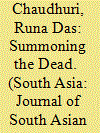

|
|
|
|
|
| Summary/Abstract |
The closing decades of the nineteenth century and the opening decade of the twentieth century were marked by an unprecedented rise in the practice of spiritual exercises in domestic séances amongst the cultural elites in Calcutta. This paper demonstrates how the sacrosanct character of these circles of grief came under suspicion when the supposedly ‘psychic’ component of spiritual matters became tainted by eroticised interactions with the dead. In this context, the afterlife was poised to become a site for the expression of female sexuality, normally repressed by a fragile politics of domineering enlightened male intellectualism.
|
|
|
|
|
|
|
|
|
|
|
|
|
|
|
|
| 11 |
ID:
179995


|
|
|
|
|
| Summary/Abstract |
This article considers the non-aggressive aftermath of an alleged iconoclasm in a residential neighbourhood of Kanpur. The ‘iconoclasts’ were recent converts to Christianity who were attempting to mark their departure from Hinduism by dismantling the deity tiles on their house. Despite the indignation this caused among their Hindu neighbours, not much ensued. While the lack of escalation may be easy to explain given the local circumstances, this article pays particular attention to how the anger of the denouncer subsided and the role of her growing knowledge about Christianity therein.
|
|
|
|
|
|
|
|
|
|
|
|
|
|
|
|
|
|
|
|
|